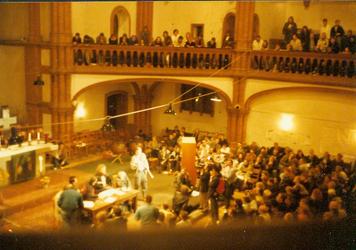Belinda
Brooklyn, NY
Eastern Europe 1989
I was living in West Berlin (I came on a Fulbright in 1987, after graduating law school) but spending a lot of time in East Berlin helping a dissident group (a number of the members also became good friends). I was also doing some journalism and acting as a fixer for journalists, so I saw a lot, both before and after November 1989. I traveled through Poland and Hungary in summer of 1989, interviewing dissidents, and was in East Berlin for the big demonstrations and events in October. On Nov. 9, when the Wall opened up, I was in East Berlin. I stayed in Berlin until 1994 and saw how the hopes of the original dissidents in some ways were not fulfilled, though their lives certainly improved.
Of course the contexts are quite different, though some things are very familiar - the process of overcoming fear and realizing lots of people think the same way you do, the euphoria, the pent-up expression that comes out in everyone talking and talking. Just from my observations, i guess the main thing is that the sense of unified purpose and the euphoric hopes that accompany revolutions cannot last, and some disappointment is inevitable. People will disagree on what they actually want, the unity will disintegrate, reality will set in and set parameters. That's not necessarily a bad thing, but it does bring a certain amount of disappointment, and that psychological element is important to anticipate and deal with. Also, people who have been living in a dictatorship for generations really do have to learn how to live with democratic institutions - it doesn't happen overnight.
The Round Tables that were held in Poland, then in E. Germany and most of the Eastern European countries, with opposition and government officials negotiating the transition over a period of months, could be a model for the Egyptians - they are kind of a visible representation of change, but give the transition some time. Finally, a big issue that I haven't seen discussed too much in the Egyptian context is the issue of transitional justice - how do you deal with collaborators with and members of the previous regime. In East Germany, there was the whole question of the secret police files and the border guard trials; Czechoslovakia had its lustration issues. How that is dealt with can create serious tensions in society, no matter how you deal with it, and that will surely come up. There is a lot of experience on that out there, though, if the Egyptians want to take advantage of it.
